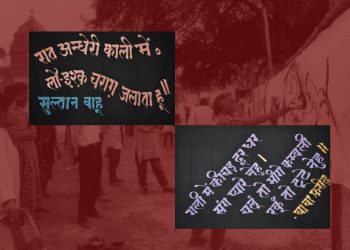Since it was formed in 1989, Sahmat has brought together diverse artists, performers, and writers on a common programme of resistance against attacks on freedom of artistic expression and dissent. Today, as the idea of India is being revamped into a singular, homogenised nation, severed from its composite and diverse heritage, ICF celebrates plurality and building of political solidarity of cultural expression.
In this ten-part series, the Indian Cultural Forum will showcase Sahmat’s work over the years — in visual, theatrical, musical or written form. Sahmat’s projects such as Slogans for Communal Harmony and Hum Sab Ayodhya, intervene in the rising communal polarisation and violence. They were a call for harmony and unity across religions, and a stand against violence. Sahmat accomplished this also by beckoning Sufi and Bhakti traditions with Anhad Garje. Music has been an integral part of Sahmat’s work. With Muktanaad, Sahmat mounted a musical celebration of composite culture, on the banks of the Saryu, in the contested city of Ayodhya to send a poignant message that the city belongs to the multiple people of this country. With Postcards for Gandhi and The Making of India Sahmat intervened in what it saw as a move away from the secular and socialist legacies of the national movement. Projects in solidarity with M F Husain send a booming message in defence of freedom of artistic expression, as much as defending attacks coming from a cynical use of public institutions.
Sahmat’s Beginnings
In 1989, playwright, actor, and activist Safdar Hashmi was fatally attacked by political thugs while performing a street play outside of Delhi. This led to the formation of the Safdar Hashmi Memorial Trust or SAHMAT (also the Hindi word for “in agreement”).
In this video, historian and Safdar’s elder brother, Sohail Hashmi, and several artists including Ram Rahman, Atul Dodiya, Vivan Sundaram, Nalini Malani and Gulam M Sheikh among others talk about Sahmat’s beginnings.
National Street Theatre Day
On April 12, 1989, Sahmat gave a call for Hashmi’s birthday to be observed as National Street Theatre Day in India. Every year since then, April 12 is marked by producing posters and engaging with theatre groups all across the country in a day of joint action and performance.
In this video, Ram Rahman, Sohail Hashmi, and Vivan Sundaram talk about the idea behind observing the National Street Theatre Day and how producing posters every year became a means of linking, conceptually, with Safdar’s ideals of using street theatre as a means of progressive social communication.




